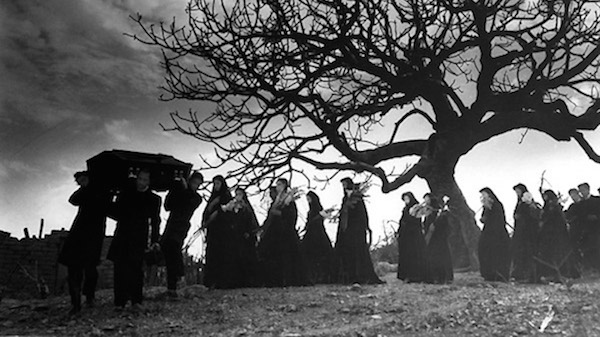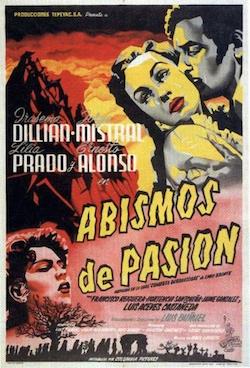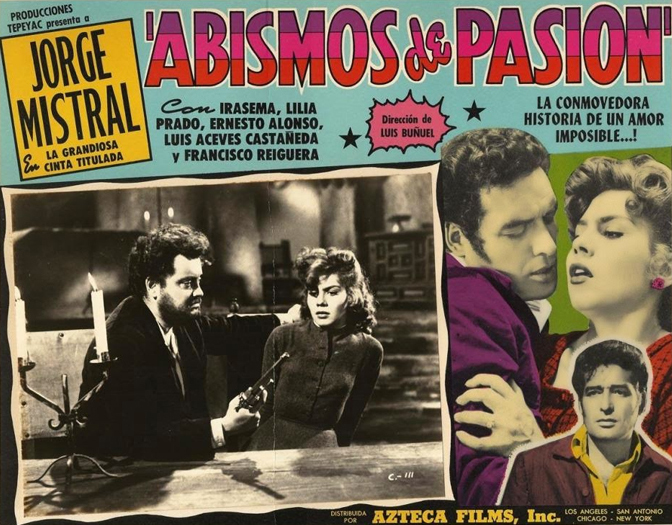
(Mexico, 1954) 91 min B&W DIR-SCR: Luis Buñuel, based on Emily Brontë’s novel. PROD: Oscar Dancigers, Abelardo L. Rodríguez. MUSIC: Raúl Lavista. DOP: Agustín Jiménez. CAST: Irasema Dilián, Jorge Mistral, Lilia Prado, Ernesto Alonso, Francisco Reiguera, Hortensia Santoveña. (Plexus)

Early in his career, Luis Buñuel had written a scenario adapting the famed Emily Brontë novel of Wuthering Heights, yet shelved it and forgot about it, especially after the classic 1939 Hollywood version. However, when a producer approached him to make a similar film about haunted love, Buñuel unearthed his old screenplay, and proceeded with this remake. At this time, the director was no longer interested in doing an adaptation of the novel- and probably would not have made it were he not initially offered the first similar project. However, it emerges as one of his most entertaining and interesting works… of this or any stage of his career.
The Brontë novel was greatly admired by Surrealists, for love is taken to the extremes, much as they pushed the conventions of art and taboo to the outermost boundaries. (To coin a phrase used in an evening of Surrealist films I saw one night: “Love sets its throne in the house of excrement”.)
I’ve never read Emily Brontë’s novel, but have read that this is a faithful translation, despite that the action has been transposed to a Mexican hacienda: Catherine is now Catalina (Irasema Dilián), Heathcliff is Alejandro (Jorge Mistral), and the imagery is full of pigs with slit throats, butterflies being pinned, and flies being consumed by spiders. Buñuel uses this visual carnage as a metaphor for the cruelty inherent in all of the characters.

Alejandro, the former stablehand, now rich, has an inseparable bond with Catalina, who, although married to someone else, will always love him. However, to show how his heart has suffered due to her matrimony, he scourges the household by marrying her husband’s sister Isabel (Lilia Prado). Within this small, dour canvas, one genuinely feels the “doom” of this doomed affair– one is subsequently moved by the savagery that people enact out of love.
At the same time, one wonders if Buñuel also meant this to be a parody of melodrama. Observe how Alejandro overplays his kissing of Isabel’s neck. Is he auditioning for Dracula? Is he overcompensating due to his love for Catherine (or thinking of her at the time)? Plus, amusingly, it seems that every night it rains: this old cliché is used to drill home the somber tone.
It makes sense too, that the images which remain with the viewer are those of the most moribund kind. With a funeral procession right out of Carl Dreyer and a memorable, tragic finale in a crypt, love is equated with death and suffering. If not a perfect film, Buñuel’s version of Wuthering Heights succeeds in being a truly visceral experience.
I had the rare privilege to see this theatrically when Toronto’s second-run Bloor Cinema scheduled a week’s worth of literary adaptations in light of then-recent big-screen renditions of Jane Austen’s Emma and Sense and Sensibility. The Brontë sisters were represented with the 1944 Jane Eyre, and two versions of Wuthering Heights the 1939 classic, and this one, which was all the provocation I needed to hop on the subway downtown. Typically, there were only ten people total at the show… and I knew three of them!
